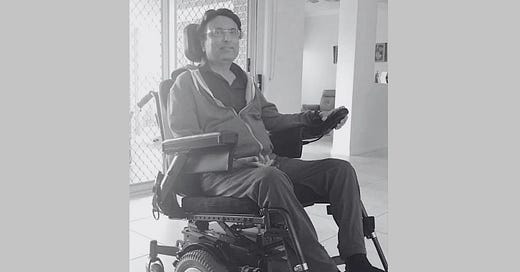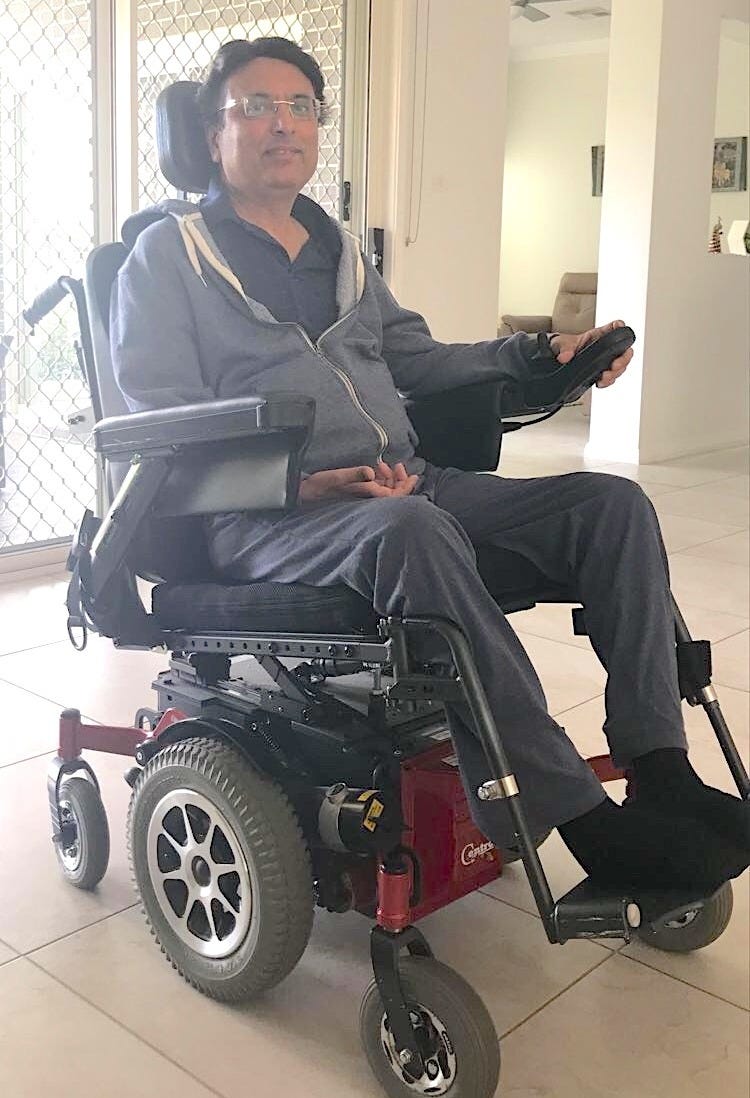Between Loss and Love: How Grief Transformed My Motherhood
How losing my dad changed the way I raise my kids
Dear Inklings,
I have the pleasure of introducing
to you today. Ruhie is a primary care physician, writer, and second-generation Indian-Australian based in Sydney, where she lives with her husband and three young children. After recently returning from maternity leave, she balances her medical career with her rekindled passion for writing.Despite loving writing as a child, Ruhie’s studies and demanding career took her away from such creative pursuits, so much so that she convinced herself she wasn’t creative. Her writing journey began in earnest three years ago while processing her grief after her father's passing, and she is now pursuing her childhood dream. What started as a desire to share his story evolved into a deeper mission: breaking the silence around grief and creating a space where others can feel seen in their experiences.
Behind the scenes, Ruhie is working on a memoir chronicling her parallel journeys as both a daughter and doctor confronting life’s fragility following her father’s ALS/MND diagnosis. Through documenting how the disease progressively robbed him of mobility, speech, and ultimately breath, she shares how making the most of their remaining time together taught her to embrace life wholeheartedly and deepen her appreciation for loved ones.
When not writing or practicing medicine, Ruhie dedicates her time to her family, finding that her children bring both “chaos and magic” to her life in unexpected ways.
I hope you enjoy Ruhie’s moving essay today.
In 2019, I became a mother for the first time. Just six months later, I lost my father after a harrowing battle with terminal illness.* Within a short span of time, I was thrown into the chaos of early motherhood while simultaneously navigating the depths of grief. I witnessed and bore the miracle of life firsthand, yet was powerless as my own dad’s life slipped away. I held my son in his first moments and my father in his last. For me, grief and motherhood are and always will be deeply intertwined.
Now, with three children aged six, four and one, grief continues to shape my parenting in profound, and at times unexpected, ways. Through sharing my story, I hope to offer comfort, insights and understanding to others who are navigating their own complex journeys of grief and parenthood.
1️⃣ Heightened anxiety about their safety
This change really threw me because I’m not naturally an anxious person. I inherited my dad’s optimistic, glass-half-full mindset and preferred not to obsess about worst-case scenarios. Despite being a doctor and dealing with illness on a daily basis, I didn’t dwell on health issues in my personal life outside of work.
That all changed when my dad was diagnosed with ALS/MND at just fifty-six. Within three short years, he went from being active and healthy to completely paralysed, unable to speak, fed through a tube, and dependent on a ventilator. One moment he was in the prime of his life; the next, he was given just two to three years to live. The realisation that life can change so suddenly, even when you’re doing everything right, was a harsh awakening.
Losing someone you love makes you acutely aware of life’s fragility, and I’ve noticed this seep into my parenting. It’s made me hyper-vigilant about my children’s health, safety, and wellbeing. I’m cautious when they’re sick, when they cross the street, or when they’re in the car (even when I’m the one driving!) Mental images of injuries and freak accidents flash in my mind from time to time. I think about the future and what could be waiting around the corner. Thankfully, it’s not all the time and it isn’t debilitating, but I can’t deny that grief has made me far more wary and protective, thinking about their health and safety much more than I ever did before.
Reconciling this newfound anxiety with the more carefree person I once was hasn’t been easy. But over time, I’ve come to see it as a reflection of my deep love for them. Wanting to protect your children and keep them safe is a natural instinct. What’s hard is knowing we can’t always be by their side, and we can’t control the future. Losing my dad taught me that. Parenting, too, is a constant lesson in letting go — doing the best we can, and learning to accept what’s beyond our control.
This awareness, that anything can happen in life, also serves as an important reminder to cherish the time we have together more than ever and not take it for granted.
2️⃣ Clarity on what matters most in life
Grief has a way of shifting your perspective on what’s truly important in life. After losing my dad, I began to reassess my priorities and realised that the things I once thought were most important no longer held the same weight.
My dad spent so much of his life working hard to provide for his family, but in his final weeks, what he regretted most was that he hadn’t spent more time with us, his children. It was a painful realisation, but one that has had a lasting impact on how I raise my own kids.
A big part of this shift has involved reflecting on my own upbringing. Growing up in an immigrant Asian household, there was always a heavy emphasis on academic success and financial stability. While my parents’ intentions were rooted in love and wanting the best for me, I now see how that pressure shaped my sense of self-worth and happiness — and how it has affected many others in my generation too. My dad’s passing shifted my focus in parenting from pushing my children toward external achievements or a specific kind of success, to helping them discover what truly fulfils them and brings them joy in life.
Ultimately, I’ve learned that what matters most is not the money we make or the career we build; it’s not about conforming to societal expectations or pursuing things that don’t fulfil you. At the end of the day, what matters most is the time we spend with the people we love. For me, the priority is building meaningful connections with my children, based on communication, compassion, trust and understanding. I want to create lasting memories with them and be fully present in their lives. It’s not about perfection either. It’s easy to get caught up in the demands of daily life and hustle culture, and I try to give myself grace when this happens. But I remind myself and make a conscious effort every day to prioritise my children, our relationship, and our time together.
3️⃣ Creating a village
This renewed appreciation I gained for the importance of relationships in the wake of grief made me think more intentionally about what kind of relationships and support system I want around me and the people I love going forward. The challenges we faced as a family with Dad's health and his death taught me firsthand the value of having a village, especially during life’s toughest moments.
My sister and I are incredibly close, and we were fortunate to have each other — our bond has been, and continues to be, an invaluable source of solidarity and strength as we navigated losing a parent. We’re truly blessed to have each otherm and recognise that, together, we were more than enough to face the challenges. And of course, we are both immensely grateful to the network of cousins, aunts and uncles, extended family and friends who supported us during this time. However, we've often reflected on how having more siblings could have added an extra layer of support — for Dad as he faced declining health and increasing disability, for Mum as she adjusted to life as a widow, and for each other as we processed our shared loss.
As morbid as it sounds, losing a parent as a parent myself made me more certain about the family I wanted to build. I’ve always loved siblings and envisioned having a bigger family — it’s something I’ve wanted since childhood and shared with my husband early in our relationship (thankfully he was on board!) Grief just gave that longstanding desire a deeper sense of purpose. In a society where the average family has two kids and raising a larger family feels increasingly difficult with the practical and financial pressures in the current cost of living crisis, I couldn’t ignore the feeling in my heart that three children was the right choice for us.
Our family feels complete, my heart feels full, and I find a deep sense of comfort knowing that my children have in each other a built-in support system for life. To me, it’s not just about creating a ‘safety net’ for them — it’s about ensuring they have the kind of bond that will carry them through both the challenges and joys of life together, no matter what comes their way.
4️⃣ Building resilience and compassion by talking openly about life’s challenges
One of the hardest parts about grief for me has been talking to my kids about death and loss. As they’ve gotten older, they’ve started asking questions I wasn’t prepared for.
“Why don’t you have a dad anymore?”
“Well, sweetie, I do still have a dad but he’s not here anymore because he died”
“What does that mean, “died”?”
“It’s a bit tricky to explain but I’ll do my best. It means his body stopped working. He had a sickness that his body couldn’t fight.”
“Where is he now?”
“No one really knows what happens when someone dies. Some people believe they go to a beautiful and peaceful place called heaven.”
“Why can’t he just come down from heaven and take me to the park this one time?”
When our oldest asked this on his fourth birthday, it broke my heart. How do you explain to a child why their grandparent who died can’t be here for their milestones? How do you stop them from feeling abandoned by someone who you know would have given anything to share their special moments and watch them grow?
We had to start talking about grief much sooner than expected, answering tough questions as honestly and age-appropriately as we could. But of course, this led to even more questions.
“Why did he die? Will that happen to me?”
“What happens when you die? Does your body evaporate?”
“Are you going to die too?”
“Do little kids die?”
……….
While these questions are so difficult to answer, I know my kids are just trying to make sense of the world, and as parents, we need to address them. I don’t want to shut them down or tell them they are too young to understand. It is so important to me that they always felt comfortable coming to us with tough conversations, even if we don’t always have the answers. I want to foster open communication and trust within our family, and for us, that started with answering questions about death and grief.
What began as conversations about loss soon opened up a much-needed space to talk about life's challenges more broadly. I don’t want them to feel blindsided when life throws curveballs at them. I want them to understand that adversity is part of the human experience, and that it’s okay to feel sad, confused, worried, or even angry, when things go wrong. By having these difficult conversations, I’m hoping to prepare them for any challenges they may face in the future, teach them the language to name their feelings, and cultivate coping skills to face whatever comes their way with resilience and heart.
It is also my wish that these open conversations help my kids develop empathy and emotional awareness. By discussing our own hardships, they hopefully start to understand that everyone faces their own struggles — sometimes ones we can see on the outside, and sometimes ones we can’t. They’re learning that we can never fully know what someone else is going through, so we should always treat others with kindness, compassion and respect.
Looking back on six years of parenting alongside grief, I realise that it has been both incredibly difficult and profoundly transformative. While losing someone I love has made me confront life's impermanence and the anxiety we feel as parents about our children's wellbeing, it has also reminded me that we can’t protect them from every hardship. What we CAN do is help them build the strength, emotional awareness, and language they need to face life's difficulties with resilience and heart. Grief has made me more present, open, and focused on the relationships that truly matter. It has taught me that, above all, the most important thing I can do as a parent is to love my children deeply, cherish the time we have together, and support them in becoming the best, happiest, and most fulfilled versions of themselves.
Losing my father will always be one of the hardest things I’ve ever experienced, but I’ve learned to hold both the pain of that loss and the joy of motherhood in my heart. Grief and love are inextricably linked, and I carry both with me every day.
A huge thank you to the wonderful, inspiring and incredibly generous Tiffany Chu for the honour of sharing this piece with your community. This is a topic that’s been on my mind for a long time and I am so grateful for your encouragement to put it into words.
And a heartfelt thank you to everyone who has taken the time to read this post, which is so close to my heart. Parenting through grief isn’t easy, but it can also be a journey of growth, understanding and connection.
I’d love to hear your thoughts on this topic. Please feel free to share your experience in the comments below — and if this piece resonated with you, please consider subscribing to my newsletter From the Heart to Beyond for more reflections on life, loss, and parenting. Let’s support each other and continue to open up these important conversations.
The Untangling is 100% reader-supported. If the writing on this publication has moved you in any way and you are a Substack writer, please recommend it to your readers.










Thank you for sharing your story. I lost my partner to MND and relate to how you reflect on your father’s life and death. You have woven the threads of life with beauty and tenderness. Thank you 🙏🏼
I was laid off for one year due to a drop in students where I taught. My girls and I would go to the nursing home to help the elders with crafts. I continued this for 3 years as I went part time after being laid off. One resident had passed away and I told my daughter that she is not here anymore. We got to the nursing home and she asked where she was. I said she had died and her response was who shot her. That lead to a whole other discussion. 'Berta